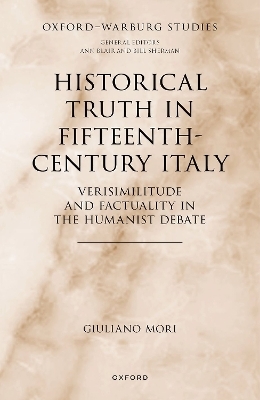
Historical Truth in Fifteenth-Century Italy
Oxford University Press (Verlag)
978-0-19-888593-1 (ISBN)
Giuliano Mori is Assistant Professor of early modern and Renaissance philosophy in the Department of Philosophy of the University of Milan. In 2016-17 he was a member of the Institute for Advanced Study in Princeton and, in 2017-18, an Andrew W. Mellon Fellow at Villa I Tatti, The Harvard University Center for Italian Renaissance Studies in Florence. His research interests focus on European intellectual history from the fourteenth to the seventeenth century with particular regard to the conceptions of truth that were developed in the period.
Part one: Verisimilitude and historical truth
I: The Brunian tradition: Political utility and the overall meaning of history
II: Facio vs. Valla: Verisimilitude and factual truth
III: Quattrocento antiquarianism: Exhaustiveness, factuality, and criticism
Part two: Verisimilitude and historical criticism
IV: Humanist criticism: Verisimilitude and historical inquisition
V: Annius of Viterbo: Historical forgery and the flaws of Quattrocento antiquarianism
Conclusion: The rise of criticism
| Erscheinungsdatum | 17.02.2024 |
|---|---|
| Reihe/Serie | Oxford-Warburg Studies |
| Verlagsort | Oxford |
| Sprache | englisch |
| Maße | 160 x 240 mm |
| Gewicht | 538 g |
| Themenwelt | Geschichte ► Allgemeine Geschichte ► Neuzeit (bis 1918) |
| Geisteswissenschaften ► Geschichte ► Regional- / Ländergeschichte | |
| ISBN-10 | 0-19-888593-8 / 0198885938 |
| ISBN-13 | 978-0-19-888593-1 / 9780198885931 |
| Zustand | Neuware |
| Informationen gemäß Produktsicherheitsverordnung (GPSR) | |
| Haben Sie eine Frage zum Produkt? |
aus dem Bereich


